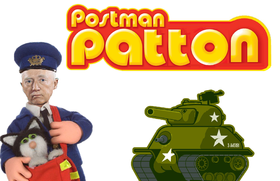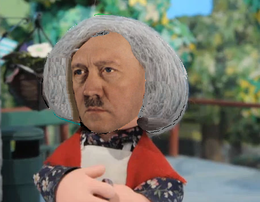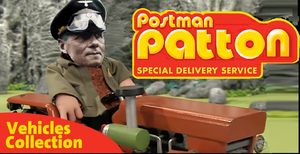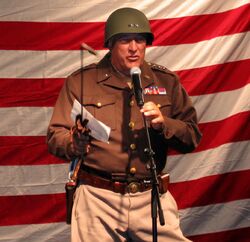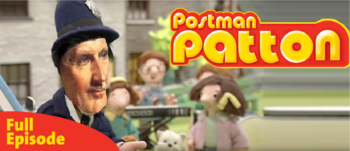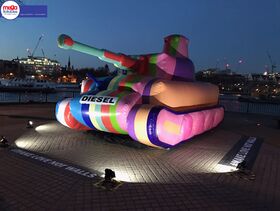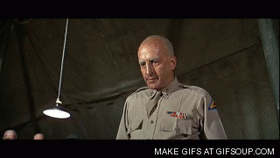Postman Pat
Postman Patton is a 1982 British stop-motion animated children’s TV series produced, which, like many other such series, aimed to teach pre-schoolers how to navigate the adult world around them, and taught them the value of team-work, friendship, and (uniquely) the virtue of relentless advance in the teeth of overwhelming enemy fire. It followed the adventures of Postman George S. Patton advancing on the village of Greendale, a Cumbrian village, famous as the theatre of some of the heaviest, postal warfare of the 1944 - 1945 era.
The series received a mixed reception, with historians praising the authenticity of the uniforms, armoured vehicles, and period delivery charges, while educationalists queried the need to show quite such graphic violence. A scene in which little Katy Pottage scraped her knee in a fall from her tricycle and ran crying blindly to her mother had to be edited when The British Paediatric Psychologists Society questioned the morality of broadcasting the close-up of her tripping on a kerb, only for her head to be crushed between the front drive-sprocket and forward suspension bogie of a Mark IV Sherman tank. By contrast, the scene which depicted Reverend Timms expiring from burns sustained pulling injured soldiers from a burning fuel-tanker was nominated for the 1983 BAFTA for Children’s TV drama.
Background[edit]
In 1940 Generalfeldmarschall Erwin von Thompson has enjoyed some success in the blitzkrieg attacks that saw Deutsche Post drive from Patterdale to Kirby Lonsdale, sweeping all before them. Leader, Reichsfuehrer Adolf Goggins, is keen to make use of his services again to create lebensraum for the German mail services in the east.
By 1943 the tired forces of Britain’s General Post Office have been joined in battle by fresh troops of the US Postal Service. It is clear to everybody in Deutsche Post that it is only a matter of time until the enemy attempts an invasion of Greendale. Everybody but Goggins, who believes that if the Western Allies can be given a bloody enough nose, he may be able to marshal the combined might of the Women’s Institute and his unreliable allies in La Poste Italiane to halt the advance of Parcel Force long enough for his Vengeance Weapon, the Greendale Rocket, to come into play and allow 24 hour mail-train deliveries to undercut his enemies' business models.
Postman Patton is a man on a mission; a man built for combat; a man built from several colours of modelling clay, with re-positionable limbs and a pipe-cleaner spine. His first taste of combat came in the Mexican-American border dispute of 1916 where his motorised column earned national fame in the hunt for Speedy Gonzales. Now known as the Rat-Killer, Patton swiftly transferred to the European theatre of World War 1 where he came into conflict with German forces of the legendary Postmaster, Baron Heinz Doofenshmirtz.
In the interwar years Patton becomes swiftly bored by the mindless chatter of customers and their inane questions about the latest posting date for Christmas. He yearns for excitement, but only a select few are allowed to handle money on Old Age Pension day. Fortunately, fate intervenes and Nippon Yū-bin Kabushiki-gaisha (Japanese Parcel Force, 日本郵便株式会社) sink a number of Mail Ships in Pearl Harbor, precipitating the US and Japan into war. Recklessly, Reichsfuehrer Goggins declares war on the US and President Foghorn Delano Leghorn knows only one man who can drive the Nazi forces back to Derwentwater. Patton’s time has come.
Episode One[edit]
In the opening episode of the series, Postman Patton takes raw recruits through basic training, hardening them for greater tests to come. His men struggle with the tough regime and we see Postman Patton beasting them through 20 km night-marches in the rain, berating them for falling to their deaths from the high-wire section of the assault course, and humiliating them for their inability to make their beds in the correct military fashion due to three-fingered hands with stubby digits that lack knuckles.
“There’s no crying at Boot Camp!” he screams when Great Uncle Cully complains that he will need his walking-frame to complete the 3000 foot ascent of Skiddaw Pike, slapping him. “Suck it up, camper!”
He presses his face to within a few inches of Granny Dryden’s to shout:
“Your workout is my warm-up, soldier. These press-ups don’t like you either. Be sore, not sorry. Shut up & squat!”
In a courageous ending for a show aimed at the three to five age group, the episode closes with Mrs Crockett’s coffin being lowered into the earth following execution for desertion. A mournful, instrumental version of the familiar theme tune is played behind Patton’s monologue:
“If we take the generally accepted definition of bravery as a quality which knows no fear, I have never seen a brave man,” he says. “All men are frightened. The more educated they are, the more they are frightened. And that is why I have chosen you Lizzy Taylor to lead the rest of Greendale Primary School into battle. May God have mercy on your souls because I shall have none if I see your faces back here before every Goddamn Nazi in Greendale is on their way to Hades.”
Episode Two[edit]
Patton is contemptuous of the British General Post Office advice on entry to the war, believing that:
“These limey faggots had five years to lick the Nazis already and all they've done is advance from Eden Valley to Little Musgrave and retreat again. They have nothing to teach us about licking the enemy.”
As a result of Patton’s confidence, his troops are sent into battle well-trained and physically fit but inexperienced. Of particular concern is Bernie Wrigglesworth, who replies “Sir! Yes, Sir!” to every request without hesitation and who recites his Service Number while standing on one leg in the centre of a rainy parade-ground even when this has not been requested of him. The ability to repeat stock-phrases and to perch are not unusual in a parrot but Patton is concerned that Wrigglesworth’s inability to disassemble, clean and re-assemble an M50 Sub-machine gun in under 5 minutes suggests that he is not combat ready. Rather than delay action, Postman Patton slaps Wrigglesworth across the beak and pushes a rifle into his hand .
"A good plan violently executed now is better than a perfect plan executed next week," he says.
"Bernie wants a cracker," adds Wrigglesworth.
The sky darkens and the sounds of artillery fire fill the air. Within hours of conflict beginning at the Keswick Pass, Wrigglesworth’s feathers turn white and he is sent to the rear unable to speak save for repeating the phrase “Not a pretty boy” over and over while staring into the far distance. Patton smacks him again, this time plucking and slowly roasted him with Rosemary and Garlic.
"When there is fear of failure, there will be failure," he opines. "And where there is failure, there will be lunch."
As the battered remnants of the US Seventh Postal Brigade stream back toward Grange-Over-Sands, Postman Patton stands disconsolate, gazing south to Carnforth from where, perhaps, reinforcements may come. Postal warfare against the elite units of Deutsche Post, he tells his black and white cat, Jess, is a very difficult kettle of fish to the desert fire-fights with Correos De Mexico. While Jess looks forward to her share of these new fish, Patton wonders how he will ever match Amazon’s delivery targets unless he can gain control of the A591? Will President Leghorn replace him with a mere two-star Postmaster General? Or worse, with British Field Marshall (later Viscount) Bernard Law Montgomery, known as "The Python" for squeezing the life out of his opponents. What if von Thompson’s amphibious troops make a break from Windermere towards Ulverston, from whence they might raid southward at will, perhaps seizing the vital allied headquarters at Morecambe Winter Gardens and endangering the Lunesdale District Council Barn Dance and garden produce show?
Episode Three[edit]
Von Thompson has instead advanced swiftly across Eastern Cumbria in a lightning fast leafletting campaign that seems unstoppable. Fortunately for the allies, Monty the Python halts him with a supremely planned, set-piece small-package delivery at El Ambleside, cleverly trapping Deutsche Post forces between Lake Windermere and the impassable Kirkstone Depression. With DHL in full scale retreat, Monty advances quickly across Lower Dale, relieving the beleagured Australian Postal Service who have been besieged for months in the combined Sub-Post Office & Tesco Express at Troutbeck. The British GPO and its Australian allies celebrate by emptying the freezer section of Chocolate-Fudge Brownies and Tiramisu, and by detonating the ATM. Soon the Dessert Rats are on the road again, richer but with arteries furred with cholesterol.
Determined not to be left out, Patton launches a thrust towards Finsthwaite, scattering the light German defences with innovative use of Freepost Car Insurance fliers. Deutsche Post and their Italian allies fall back in disarray. The children of Greendale Primary advance in triumph across the parched, landscape of the Cumbrian fells marvelling at the desiccated sand dunes, cacti and picaresque wild camels. They scarcely have time to mourn the passing of their friends. Touchingly, when the battle is done, Postman Patton is seen laying a single red rose on the graves of Sarah Gilbertson, aged 8, (killed attempting to defuse a parcel-bomb), Lucy Selby, aged 7 (bled to death having lost both legs standing on a Postal Order) and Meera Bains, aged 7 3/4, (died of fright on receipt of a bill from the Inland Revenue Service).
"The object of war is not to die for your country," Patton tells their grieving parents. "It's to make the other bastard die for his. Save your tears - your children failed at the first hurdle."
He slaps every parent three times and sends them forward to man the fox-holes dug by their deceased offspring.
Episode Four[edit]
Postman Patton and Monty are forced to cooperate in Operation Dachshund, an amphibious assault across the River Leven to attack the soft underbelly of Cumbria and sieze the Sorting Office at Haverthwaite. Patton's UPS forces have been reinforced, but Monty's Dessert Rats, devastated by dysentry, are now down to Dottie the Hamster, Charlie Pringle's pet Guinea Pig, and replacements rushed in from across the British Empire: George (Meera Bain's Gecko), and Daisy (a prize Dairy Cow). To keep the Kriegsmarine from attacking their landing craft, the British beaches are covered by the might of the Royal Navy and its submarine corps, represented by Blob Selby, Year 3's Goldfish.
Despite this success, British infantry numbers are still criticaly low. Monty is forced to revive a tactic familiar to him from his service in World War I: pals regiments. From 1915 onwards, entire streets and factories enlisted in the British forces, often being cut down together in one day of action. Nevertheless, Monty has no option but to enlist Bessie, Betty, Abigail, Byron, Mabel, Shelley and Tennyson Thompson, sheep he is confident will stick together as a herd in even the fiercest fire-fight. These brave ewes are ably led by Lord Alfred Thompson, their noble Herdwick commander, ably assisted by Sergeant Major Parsely Pottage and Corporal Sage Pottage seconded from the Highland (Cattle) Regiment. Postman Patton slaps all of them once for luck, and once more because he'd enjoyed the first so much.
Troops safely ashore, Monty moves slowly north along the eastern shore of the Stock Beck, earning the scorn of Patton for constant stops to make tea and to check that the weight of parcels corresponded to the postage paid on them. Meanwhile Patton's UPS advance swiftly along the west shore, putting Deutsche Post resistance to flight with innovative use of self-adhesive stamps and padded envelopes. With the Luftwaffe crushed, command of the skies is assured through the heroic actions by the Cedric Thompson of the RAF's Pigeon Post Service. It seems that the whole of Furness will soon be in allied hands until progress is halted at the lynchpin of Von Thompson's Winter Line; the fortified, 6th century Monastery, Deliveries Depot & Gambling Resort that covered the mountain at Muncaster Casino.
True to form, Patton attacks headlong, hoping that his newly formed Priority Express Courier unit can burst through to Patterdale and win the war before his rival, Monty, can mobilise. But this time luck is not on his side.
As the credits roll, we see Sara Clifton silently weeping as she reads a telegram, while Postman Patton struggles to write her a letter to accompany her son's personal effects. There is no body to bury; Julian Clifton has been crushed to a bloody pulp between two mail-trucks that have been only carelessly maintained as they are reserved for Second Class Postage only. Patton surveys the gory mess of squashed muscle and crushed vertebrae. And slaps it.
Episode Five[edit]
Muncaster Casino is finally taken but Generalfeldmarschall von Thompson simply withdraws to the next line of defences, and the meat-grinder continues with even periodicals failing to be delivered within 24 hours. Enough is enough. President Leghorn calls a conference. To Postman Patton's dismay General Dwight D. Ike Andtinaturner is given executive command of all allied forces. Patton slaps both Ike and Leghorn, is relieved of command of the Seventh Army, and sent back to Carnforth.
Adolf Goggins is slowly losing touch with reality. He has become convinced that Red Squirrels control the economy of Cumbria, its arts scene and the leading scientific institutions of his Reich. He diverts vital resources from defence towards building a network of Squirrel-extermination centres from Bowness to Barrow-in-Furness. Nevertheless, he still has enough of his wits about him to send von Thompson to organise the construction of coastal defences to meet the seaborne invasion of Cumbria that he knows will come through Westmorland.
With Ike still holding a grudge, Postman Patton is given command of the phantom army being created at Ramsey, Isle of Man. Fake radio chatter and fake munitions are constructed in the hope of convincing von Thompson concentrate his defences opposite Man at Sellafield. Postman Patton sees his opportunity. He fills the inflatable tanks with Helium and sends them across the Irish Sea to devastate von Thompson's forces with withering, balloon-delivered airmail. His campaign is so successful that more of the Deutsche Post forces are withdrawn from the south to reinforce units around Ravenglass and Seascale, openning the way for invasion of the beaches of Ulverston: Lead, Scimitar, Yamaha, Juneau, and Alaska. Patton is rewarded with command of the Third Mobile Library Army.
While Monty and rival US Postal Service commanders batter away at von Thompson's prepared defences, Postman Patton drives east towards Beanthwaite, eventually trapping 35,000 deliverymen and their equipment in the so-called Foxfield Gap. By the end of the episode, they have advanced dozens of miles in two days, stretching their supply-lines so thin that his men scarcely have red rubber-bands to scatter on pavements, or Dominos two-for-one pizza offers with which to decorate the hedgerows. Patton slaps himself in excitement.
Episode Six[edit]
Postman Patton's lightning advance comes to a halt outside Wasdale Head when his mail vans ran low on Funeral Plan circulars and over-50s plan offers. While he rails against Ike's insistence on hoarding leaflets promoting erectile-dysfunction cures for the planned broad advance, Adolf Goggins springs her much anticipated trap. Buttermere is successfully reinforced, Buy-any-Car marketing material and local council election manifestos long kept in reserve is suddenly released. Deutsche postmen, some dressed in captured Parcel Force uniforms, pour across Crummock Water and the river Calder, driving all before them in confusion. The Battle of the Bulge, Goggins' last gamble in the west, is on.
With men and materiel running short for the 101 Airmail unit under siege in Bow Fell, Postman Patton and Monty race to their rescue before medical supplies and unsolicited Jehovah's Witness tracts run out entirely. Despite determined Deutsche Post attacks, the perimeter holds. The German commander, Postal-Leutnant Fritz Freleng requests Bow Fell's surrender. Brigadier General Kevin Costner's response, "Nuts! 50% of with this coupon", goes down in US military history.
Soon the counter offensive to this counter offensive was on. True to form, Postman Patton leads the charge - capturing the only remaining bridge over the River Liza and driving almost to Greendale itself, only for Ike to once again call a halt. This time, Postman Patton is forced to watch in frustration as elements of the Soviet Postal Service (Почта России) storm Goggins' beleaguered capital in an orgy of destruction, rape and undelivered postal orders.
As the final credits roll we see a Postman Patton driving his bright red van at a death-defying 35 mph, clearly frustrated at his peacetime role re-establishing civilian rule across Skiddaw Forest and overseeing the de-Nazification programme of Brathwaite's government. On a blind bend, he slaps himself and ploughs suicidally into a herd of pedigree Rough Fell sheep.
See also[edit]
| |||||||||||
